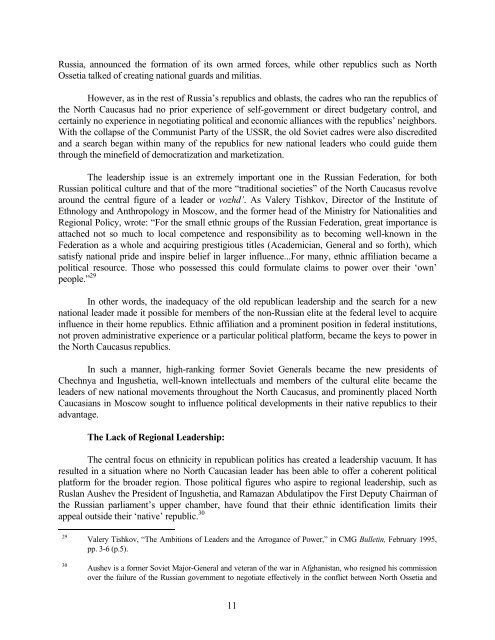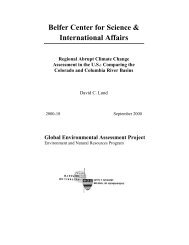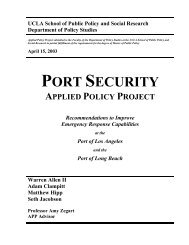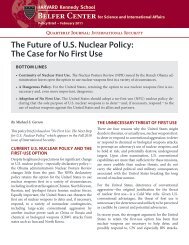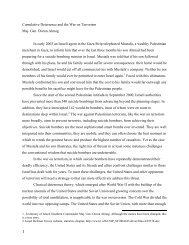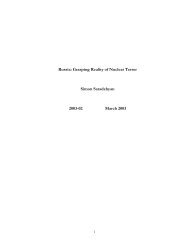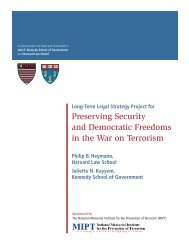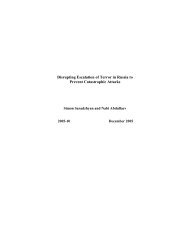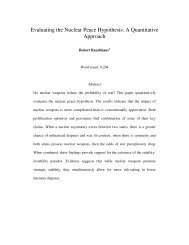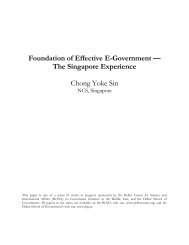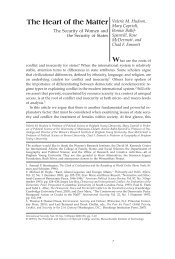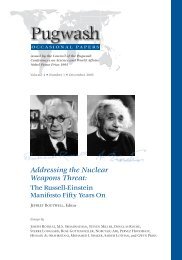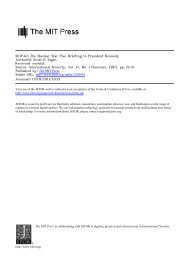RUSSIA'S TINDERBOX - Belfer Center for Science and International ...
RUSSIA'S TINDERBOX - Belfer Center for Science and International ...
RUSSIA'S TINDERBOX - Belfer Center for Science and International ...
Create successful ePaper yourself
Turn your PDF publications into a flip-book with our unique Google optimized e-Paper software.
Russia, announced the <strong>for</strong>mation of its own armed <strong>for</strong>ces, while other republics such as North<br />
Ossetia talked of creating national guards <strong>and</strong> militias.<br />
However, as in the rest of Russia’s republics <strong>and</strong> oblasts, the cadres who ran the republics of<br />
the North Caucasus had no prior experience of self-government or direct budgetary control, <strong>and</strong><br />
certainly no experience in negotiating political <strong>and</strong> economic alliances with the republics’ neighbors.<br />
With the collapse of the Communist Party of the USSR, the old Soviet cadres were also discredited<br />
<strong>and</strong> a search began within many of the republics <strong>for</strong> new national leaders who could guide them<br />
through the minefield of democratization <strong>and</strong> marketization.<br />
The leadership issue is an extremely important one in the Russian Federation, <strong>for</strong> both<br />
Russian political culture <strong>and</strong> that of the more “traditional societies” of the North Caucasus revolve<br />
around the central figure of a leader or vozhd’. As Valery Tishkov, Director of the Institute of<br />
Ethnology <strong>and</strong> Anthropology in Moscow, <strong>and</strong> the <strong>for</strong>mer head of the Ministry <strong>for</strong> Nationalities <strong>and</strong><br />
Regional Policy, wrote: “For the small ethnic groups of the Russian Federation, great importance is<br />
attached not so much to local competence <strong>and</strong> responsibility as to becoming well-known in the<br />
Federation as a whole <strong>and</strong> acquiring prestigious titles (Academician, General <strong>and</strong> so <strong>for</strong>th), which<br />
satisfy national pride <strong>and</strong> inspire belief in larger influence...For many, ethnic affiliation became a<br />
political resource. Those who possessed this could <strong>for</strong>mulate claims to power over their ‘own’<br />
people.” 29<br />
In other words, the inadequacy of the old republican leadership <strong>and</strong> the search <strong>for</strong> a new<br />
national leader made it possible <strong>for</strong> members of the non-Russian elite at the federal level to acquire<br />
influence in their home republics. Ethnic affiliation <strong>and</strong> a prominent position in federal institutions,<br />
not proven administrative experience or a particular political plat<strong>for</strong>m, became the keys to power in<br />
the North Caucasus republics.<br />
In such a manner, high-ranking <strong>for</strong>mer Soviet Generals became the new presidents of<br />
Chechnya <strong>and</strong> Ingushetia, well-known intellectuals <strong>and</strong> members of the cultural elite became the<br />
leaders of new national movements throughout the North Caucasus, <strong>and</strong> prominently placed North<br />
Caucasians in Moscow sought to influence political developments in their native republics to their<br />
advantage.<br />
The Lack of Regional Leadership:<br />
The central focus on ethnicity in republican politics has created a leadership vacuum. It has<br />
resulted in a situation where no North Caucasian leader has been able to offer a coherent political<br />
plat<strong>for</strong>m <strong>for</strong> the broader region. Those political figures who aspire to regional leadership, such as<br />
Ruslan Aushev the President of Ingushetia, <strong>and</strong> Ramazan Abdulatipov the First Deputy Chairman of<br />
the Russian parliament’s upper chamber, have found that their ethnic identification limits their<br />
appeal outside their ‘native’ republic. 30<br />
29 Valery Tishkov, “The Ambitions of Leaders <strong>and</strong> the Arrogance of Power,” in CMG Bulletin, February 1995,<br />
pp. 3-6 (p.5).<br />
30 Aushev is a <strong>for</strong>mer Soviet Major-General <strong>and</strong> veteran of the war in Afghanistan, who resigned his commission<br />
over the failure of the Russian government to negotiate effectively in the conflict between North Ossetia <strong>and</strong><br />
11


